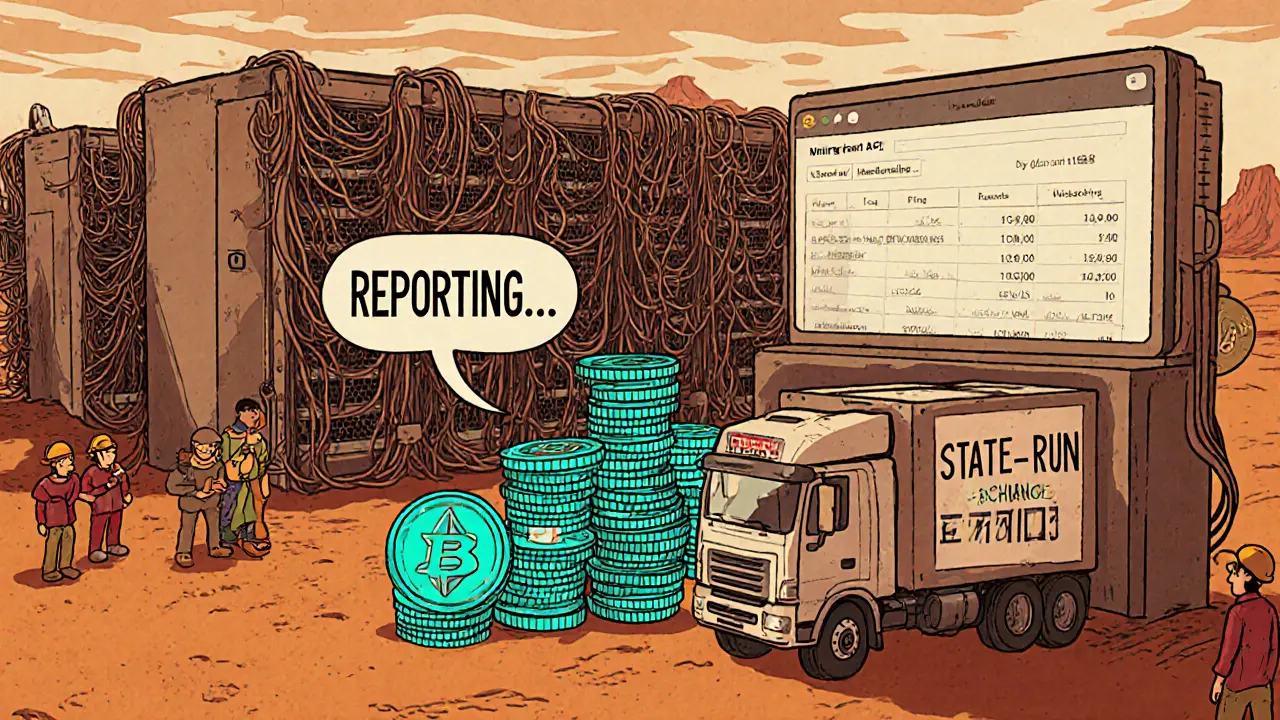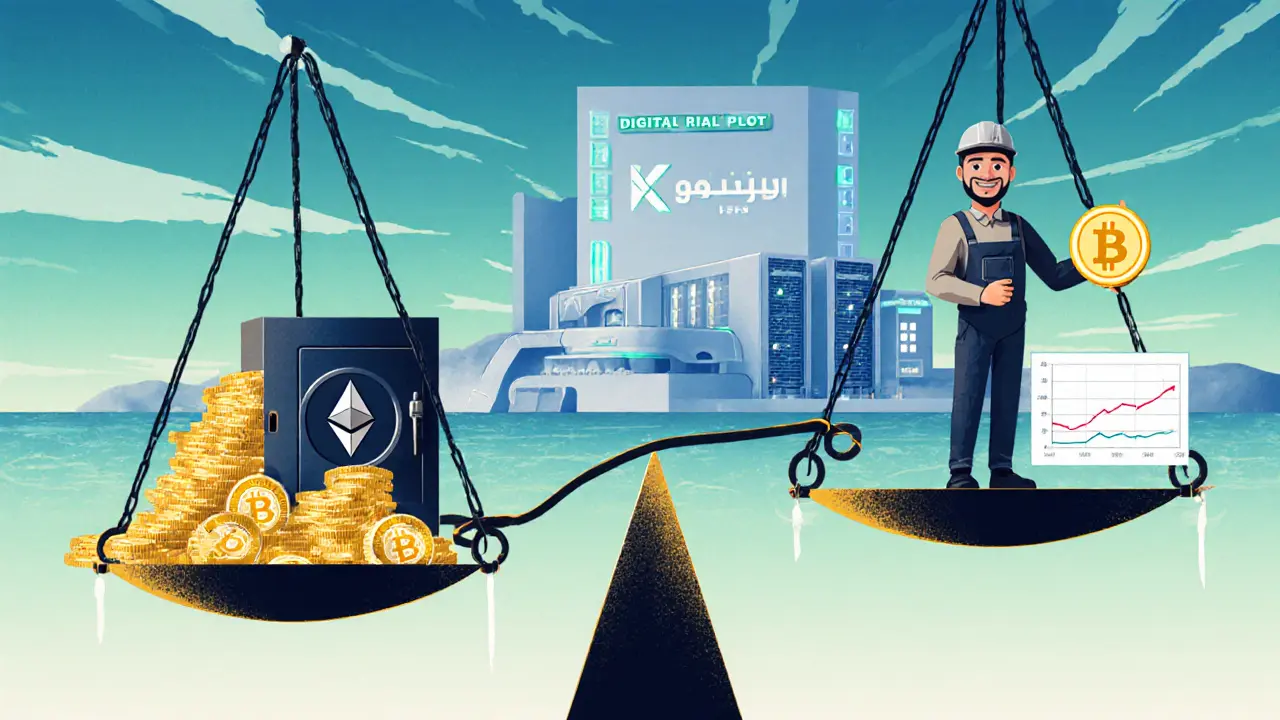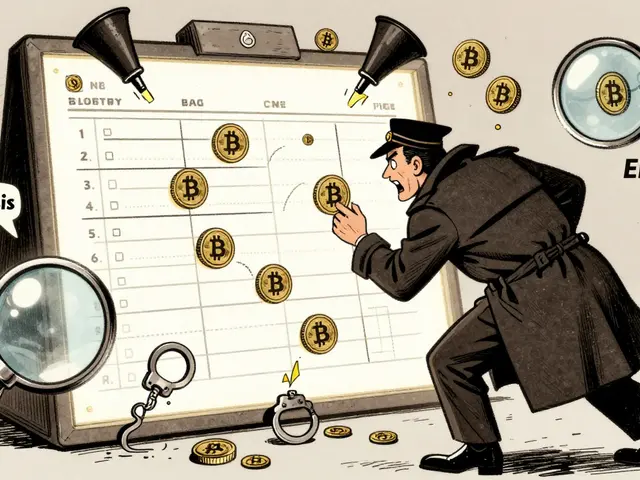
Iranian Crypto Mining Sales Calculator
This calculator estimates the mandatory crypto sales percentage and value based on your daily hash-rate output. The CBI assigns a percentage (typically 10-20%) of your output to be sold to state-run exchanges.
Mandatory Sales Summary
Daily Hash-Rate: TH/s
Cryptocurrency:
Sales Percentage:
Estimated Value Sold:
Converted to Rials:
When you hear that the Iranian Central Bank (CBI) has rolled out a new framework that forces crypto miners to sell a portion of their output to the state, it sounds like another heavy‑handed move. In reality, the rule is part of a broader 2025 regulatory overhaul that blends licensing, data transparency, and energy management. This article breaks down what the law actually says, how miners can stay compliant, and what the ripple effects might be for the Iranian crypto ecosystem.
Why the Central Bank is Getting Involved
Back in January2025, President Masoud Pezeshkian officially handed the CBI the exclusive mandate to police every crypto‑related activity in Iran-mining, trading, and even holding digital assets. The government’s goal is three‑fold:
- Capture revenue from the lucrative mining sector to offset sanctions‑driven losses.
- Prevent capital flight by restricting domestic crypto payments.
- Maintain strict oversight of energy consumption, which strains an already fragile grid.
These objectives birthed the Policy and Regulatory Framework for Cryptocurrencies, a document that forces every participant to register, share data, and, for miners, allocate a slice of their daily hash‑rate output to the state‑approved channels.
What "Mandatory Crypto Sales" Actually Means
The phrase mandatory crypto sales has sparked headlines, but the legal text is more nuanced. Here’s the core requirement:
- Every licensed mining operation must report its total daily hash‑rate to the CBI via a government API.
- Based on that report, the CBI assigns a %‑value-usually between 10% and 20%-that must be sold to a state‑run exchange within 48hours.
- The exchanged crypto is immediately converted to rial and deposited into a designated Treasury account.
The rule applies whether the miner runs a small rooftop rig or a massive 175‑MW farm like the one in Rafsanjan that the IRGC co‑owns. Non‑compliant operators face hefty fines, revocation of licenses, and potential seizure of equipment.
Licensing and Data Transparency: The Two Pillars
Before any miner can even think about sales, they need a CBI license. The licensing process, outlined in the Crypto Mining License, requires:
- Proof of ownership or lease of the power supply.
- Installation of a real‑time monitoring system that feeds hash‑rate data to the central API.
- Annual AML/CTF audits that include KYC checks on any personnel handling the crypto output.
Data transparency isn’t just a bureaucratic hoop-it’s the engine that lets the CBI calculate the mandatory sales slice. The API captures every block mined, timestamps, and the wallet addresses used for the mandatory sales.

Energy Constraints and the Role of the IRGC
Iran’s power grid is already under pressure. Unauthorized mining farms were blamed for nationwide outages in December2024, prompting the government to tighten enforcement. The IRGC, which runs many of the state‑aligned farms, now works hand‑in‑hand with the CBI to allocate dedicated, low‑cost electricity to licensed miners. In exchange, those farms must meet the mandatory sales quota and submit detailed energy consumption reports.
Compliance Checklist for Miners
| Step | What to Do | Deadline / Frequency |
|---|---|---|
| 1. Obtain License | Submit power contract, install monitoring API, pass AML audit | Within 30 days of operation start |
| 2. Report Hash‑Rate | Send daily hash‑rate data to CBI API | Every 24hours |
| 3. Receive Sales Percentage | CBI automatically returns % to sell based on reported output | Within 2hours of report |
| 4. Execute Sale | Transfer required crypto to state‑run exchange, confirm conversion to rial | Within 48hours |
| 5. Submit Energy Report | Upload monthly electricity consumption figures | Monthly |
| 6. Annual Audit | Undergo AML/CTF audit, verify KYC records | Yearly |
Impact on the Iranian Crypto Market
Since the mandatory sales rule went live, a few trends are emerging:
- Liquidity Shift: State‑run exchanges see a steady inflow of Bitcoin and Ethereum, improving rial‑crypto convertibility for the government.
- Reduced illicit mining: Unauthorized farms are shrinking as the penalty risk rises.
- Price pressure: Selling 10‑20% of daily output can push local crypto prices down, especially for Ethereum.
- Investor sentiment: International observers view the rule as a sign that Iran can monetize its mining power without completely opening the market.
Meanwhile, the Digital Rial Pilot on Kish Island is being fine‑tuned using the state‑collected crypto revenues, hinting at a future where the government could replace a chunk of dollar demand with locally‑minted digital currency.

What Miners Can Do to Stay Ahead
Even with the rule in place, there are ways to protect profitability:
- Optimize Mining Pools: Join pools that let you allocate the mandatory sales portion to a specific wallet, simplifying the conversion step.
- Invest in Energy Efficiency: Use ASICs with higher hash‑per‑watt ratios; lower electricity bills mean the sales slice eats up less of your margin.
- Diversify Crypto Types: The CBI’s percentage applies across all mined coins; shifting a part of your operation to mine less volatile tokens can smooth revenue.
- Stay Informed on % Changes: The CBI reviews the sales percentage quarterly. Keeping tabs on official bulletins helps you forecast cash flow.
Finally, build a solid compliance team. Legal counsel familiar with Iranian AML law and an IT group that can handle the API integration are worth the upfront cost.
Future Outlook: Will the Rule Evolve?
Experts predict two possible paths:
- Increased Centralization: The government could tighten the percentage, especially if rial inflation spikes, turning mining into a reliable revenue stream.
- Gradual Liberalization: International pressure might coax Tehran into easing the rule, perhaps allowing a small portion of mined crypto to stay with the operator for export.
Either way, the next six months will be telling. Watch for announcements from the CBI’s “Crypto Oversight Committee” and any new directives from the Cyberspace Council.
Frequently Asked Questions
Does the mandatory sales rule apply to all miners?
Yes. Any operation that holds a Crypto Mining License must comply, regardless of size or the type of cryptocurrency being mined.
How is the sales percentage calculated?
The CBI uses the daily hash‑rate report you submit via its API. It then applies a formula that considers total national mining output, current rial inflation, and energy consumption targets. The result is a percentage-usually 10‑20%-that you must sell.
What happens if I miss the 48‑hour sale window?
You’ll be fined an amount equal to twice the missed sale value, and repeated offenses can lead to license suspension or confiscation of mining hardware.
Can I sell the mandatory portion on a foreign exchange?
No. The rule mandates that the crypto be transferred to a state‑approved Iranian exchange, which then converts it to rial. Using foreign platforms bypasses the CBI’s data‑collection mechanism and is illegal.
Is there any exemption for small‑scale miners?
The CBI announced a modest exemption for home‑based rigs producing less than 0.5TH/s. Those operators still need to register but are not subject to the mandatory sales percentage.
How does the rule affect the price of Bitcoin in Iran?
Forced daily sales add supply to the local market, which can create short‑term downward pressure on Bitcoin prices, especially when the mandatory percentage is at the higher end of the range.





Comments (9)
Chloe Jobson
This is actually one of the smarter moves Iran’s made in years. Forcing miners to sell a slice to the state turns a black-market energy drain into a controlled revenue stream. The API reporting? Genius. No more guessing games.
And the 0.5TH/s exemption for home miners? That’s the kind of nuance you don’t see in most crypto regulations. They’re not trying to crush small operators-they’re just cutting the fat.
Andrew Morgan
so like... theyre basically taxing hash power like it's oil
and honestly i kinda respect that
instead of banning it they just made it pay for the grid
iran is doing crypto better than half the west right now
Michael Folorunsho
Let’s be real-this is a dictatorship masquerading as economic policy. The IRGC co-owning 175-MW farms? That’s not regulation, that’s state-sponsored theft wrapped in compliance jargon.
Anyone who calls this a ‘smart move’ is either a regime apologist or hasn’t looked at Iran’s human rights record. Crypto isn’t a revenue tool-it’s a freedom tool. And this is how authoritarians neutralize it.
Roxanne Maxwell
It’s wild to see a country under sanctions use crypto this strategically. Most places panic and ban it-Iran just built a pipeline.
The Digital Rial pilot on Kish Island? That’s the real endgame. They’re not just collecting cash-they’re building a parallel financial system. And honestly, it might work.
Big props to the CBI for not going full crypto-hysteria. Even with the control, they left room for miners to survive.
Jonathan Tanguay
Ok so first off the 10-20% mandatory sale is way too low if you ask me and if they really wanted to monetize this theyd be taking 30-40% but then again they dont want to drive everyone underground which is smart but also the fact that theyre using a government api to track hash rate in real time is just flat out brilliant i mean most countries cant even track their own tax revenue properly and here iran is building a blockchain based fiscal engine that could literally replace the dollar in regional trade if they play it right and dont mess it up with corruption which they probably will but still the concept is flawless and anyone who says otherwise is just jealous because they dont have the guts to do something this bold in the west where everyone just screams about decentralization but then turns around and bans crypto mining because theyre scared of losing control of the money supply and honestly if you think about it this is the future of sovereign digital currency and the fact that its coming from iran of all places just proves that innovation doesnt come from where you think it does its coming from places that have no other choice and thats why they win
Ayanda Ndoni
Wait so they take your crypto and give you rials? But rials are basically toilet paper now right?
So you’re mining Bitcoin just to get paid in something that loses value faster than your phone battery?
Why even bother? Just sell on the black market and laugh all the way to the bank.
Also who’s checking the energy reports? The same guys who let the grid crash last year?
Feels like a scam with paperwork.
Elliott Algarin
This is a fascinating case study in how authoritarian systems can co-opt decentralized tech for their own ends.
It’s not about control for control’s sake-it’s about survival. When you’re cut off from global finance, you adapt. And this? This is adaptation with teeth.
The real question isn’t whether it’s fair-it’s whether it’s sustainable. If the CBI can maintain transparency and avoid overreach, this could become a blueprint for other sanctioned economies.
Or it could collapse under its own weight. Either way, we’re watching history in real time.
John Murphy
the part about the 0.5TH/s exemption is actually really thoughtful
most policies just lump everyone together
but here they recognized that a guy with two rigs in his garage isn’t the same as a 175mw farm
that’s rare
and the fact that they’re using the sales to fund the digital rial pilot? that’s next level
they’re not just taxing-they’re building
Zach Crandall
While I appreciate the technical sophistication of this regulatory framework, I must express concern regarding the implications for individual economic liberty. The mandatory conversion of mined cryptocurrency into fiat currency through a state-controlled exchange constitutes a de facto capital control mechanism, which, under international financial norms, would typically be regarded as a violation of the principle of free asset movement.
Furthermore, the integration of the IRGC into the enforcement architecture raises significant ethical and governance concerns, particularly given its designation as a terrorist organization by multiple Western governments. The blurring of state security apparatuses with economic policy undermines the legitimacy of the entire system, regardless of its operational efficiency.
One must also consider the long-term viability of a model predicated on forced sales-market distortions may lead to decreased mining investment, reduced hash rate, and ultimately, diminished revenue for the state. A more sustainable approach would involve incentivization rather than coercion.